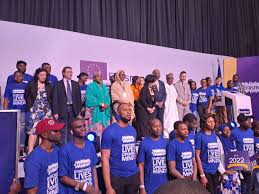In a notable achievement for Nigerian students, the European Union (EU) has reaffirmed Nigeria’s prominence as the top beneficiary of its postgraduate scholarships in Africa for the sixth consecutive year. The EU Ambassador to Nigeria and ECOWAS, Ms Samuela Isopi, recently announced the award of 142 postgraduate scholarships to young Nigerians for the 2024-2025 academic session under the prestigious Erasmus+ program. This initiative reflects the EU’s commitment to educational excellence and cross-cultural collaboration.

The Erasmus Mundus scholarship, funded by the EU, is a testament to the outstanding academic potential of Nigerian students. It provides opportunities for selected students to pursue Master’s or Doctoral degrees in top European universities through the Erasmus Mundus Joint Programmes. The fact that Nigerian students have been consistently excelling and securing these scholarships showcases the country’s wealth of talent and intellectual capability on a global scale.
Ms. Isopi highlighted the transformative impact of the Erasmus Mundus program, emphasizing how it benefits not only the individual scholars but also contributes to the overall development of higher education institutions and countries, both within and outside the EU. The rigorous selection process, which saw thousands of candidates from around the world vying for the scholarships, further underscores the high caliber of Nigerian students in the global academic arena.
Nigeria’s remarkable achievement as the top country in Africa and among the top five worldwide, alongside countries like India, Pakistan, and Bangladesh, underscores the nation’s position as a hub of talent and excellence. The EU’s investment in Nigerian scholars not only enhances their personal growth and expertise but also equips them to contribute significantly to the development of their home country upon their return.
The 142 scholarship recipients will embark on a profound learning journey, studying in various European countries and gaining specialized knowledge in diverse fields such as Renewables-based Power Systems, Public Health in Disasters, and Sustainable Engineering. The exposure to different cultures, academic environments, and areas of expertise will undoubtedly enrich their academic experience and broaden their perspectives.
Furthermore, the EU’s collaboration with Nigerian governments in states including Kano, Sokoto, Oyo, and Enugu to strengthen the education system and promote digital technology underscores a broader commitment to uplift the educational landscape in Nigeria. By investing in education projects aimed at enhancing green skills, knowledge, and digital literacy, the EU is empowering the next generation of Nigerian leaders and innovators.
As the scholarship recipients prepare to commence their Erasmus Plus journey in September, the EU’s pre-departure orientation seeks to equip them with the necessary tools and guidance to maximize the opportunities available to them. Through this initiative, the EU is not only investing in individual talent but also nurturing a sustainable framework for educational growth and collaboration between Europe and Africa.
Nigeria’s consistent success in securing EU postgraduate scholarships signifies a beacon of hope for the country’s educational landscape. By nurturing and empowering its brightest minds, Nigeria is poised to drive innovation, knowledge exchange, and sustainable development within the global academic community.



